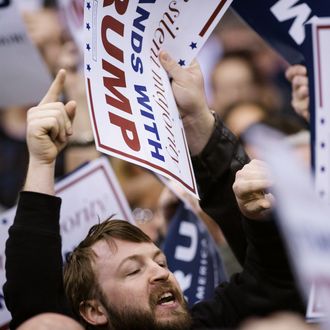
Much of the awe and fear inspired by Donald Trump’s presidential campaign arises very obviously from his successful defiance of every single preexisting guideline for American political behavior. He’s lewd and crude. He openly and frequently crosses the outer boundaries of contemporary standards of discourse about gender and race. He has little regard for expert validators of facts or gatekeepers of credibility. He baits his detractors and seems to delight in terrorizing news-media people with threats of suppression and retaliation. This has all been commented upon endlessly and with great malice from almost every direction. But Trump flourishes to the point where some observers suspect he cannot possibly do anything to damage himself in the eyes of his adoring supporters.
Aside from the sheer entertainment value of Trump’s political performance art, the best explanation we have for his core appeal comes from Thomas Edsall, who dips into social-science research to expand on a phenomenon we’ve all observed to some extent: the current overwhelming opposition to “political correctness” evident among conservative white people, and particularly men.
Trump has capitalized on the visceral belief of many white voters that government-enforced diversity and other related regulations are designed “to bring Americans to submission” by silencing their opposition to immigration — legal and illegal — to judicial orders putting low-income housing in the suburbs, and to government-mandated school integration, to name just a few of their least favorite things.
Trump’s supporters, judging from the venom with which they refer to “political correctness,” perceive the network of state, local and federal anti-discrimination laws and directives as censorious and coercive.
These folks probably overlap significantly with the 27 percent of white Americans who reported in one recent survey that they “face a lot of discrimination.”
So they applaud Trump’s defiance of “political correctness” in word and in deed. But it goes further than mere defiance of elite norms, according to one of Edsall’s academic sources, who cites a phenomenon known as “psychological reactance”:
[Reactance is] the feeling you get when people try to stop you from doing something you’ve been doing, and you perceive that they have no right or justification for stopping you. So you redouble your efforts and do it even more, just to show that you don’t accept their domination. Men in particular are concerned to show that they do not accept domination.
Men are particularly concerned to show they do not accept domination from censorious women — like feminists in general and Hillary Clinton in particular.
So they act out, and applaud the politician who is acting out. When they (or Trump) draw condemnation by elites (or by their women-and-minorities clientele) for this acting out, that becomes a fresh grievance. And so it goes in a continuous feedback loop of resentment and defiance.
Says another social scientist, the bond between Trump and his anti-p.c. fans gets tighter the more the outrage and counter-outrage escalates:
Trump comes along and punches political correctness in the face. Anyone feeling some degree of anti-PC reactance is going to feel a thrill in their heart, and will want to stand up and applaud. And because feelings drive reasoning, these feelings of gratitude will make it hard for anyone to present arguments to them about the downsides of a Trump presidency.
Trump’s “Teflon,” then, is in no small part a function of his emotional solidarity with voters — heavily concentrated among Republicans and Republican-leaning independents — who see him, like themselves, as a victim of “censorious and coercive” power plays by elites. Like Trump, they fear the wholesale loss of everything associated with the once-great America of their memories or imaginations.
How large is this circle of “reactance”? Maybe not all that large; many Americans who express hostility to “political correctness” probably have in mind narrower phenomena of over-the-top campus-based speech codes rather than basic government anti-discrimination policies. But in the current polarized atmosphere, many, many people who don’t necessarily share the psychology of Trump’s core supporters are lining up to support their party’s nominee and are now vested in downplaying his outrageousness — or even enjoying it. If, however, Trump misjudges his core supporters and outrages them with utterances or revealed behaviors that betray their trust — say, a suspect online “university” that tends to play regular folks for suckers — then the whole thing could unravel.






























